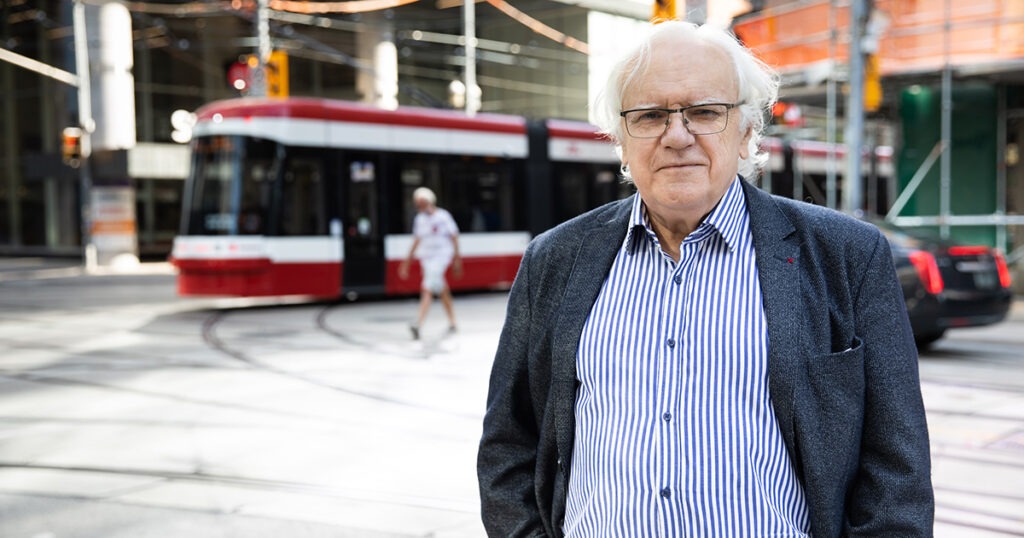Dr. John Marshall shares how Unity Health’s role in a global trial has made its mark

Dr. John Marshall
Dr. John Marshall
By Ana Gajic
Groundbreaking collaboration on an innovative clinical trial by scientists around the world has led to discoveries at breakneck speeds and changed the treatment of COVID-19 patients globally.
Dr. John Marshall is the Canadian lead on the global REMAP-CAP trial. REMAP-CAP, which stands for Randomised, Embedded, Multifactorial, Adaptive Platform for Community Acquired Pneumonia, is a new type of clinical trial that allows scientists to test multiple treatments simultaneously in the same patient groups and to randomize patients to receive the treatments that seem to be faring the best.
Now, a year after the trial pivoted to tackle COVID-19, we sit down with Dr. Marshall, who is also a critical care doctor and scientist at the Keenan Research Centre for Biomedical Science, to reflect on what’s been learned – and how this model can help scientists tackle future pandemics.
What are some of the key findings the REMAP-CAP trial has reached?
With the recent waves of COVID-19 our recruitment has skyrocketed. We’ve recruited more than 6,500 patients worldwide with COVID-19 and reached a number of trial conclusions.
The most important recent findings:
- Hydrocortisone, a commonly available corticosteroid used to treat illnesses like eczema, asthma and arthritis, is beneficial for patients with severe COVID-19 on mechanical ventilation.
- The inhibition of interleukin-6 (IL-6) – a protein that is important in stimulating an immune response – improved the survival of COVID-19 patients in the ICU by eight per cent.
- This effect is additive to the effects of corticosteroids (like hydrocortisone), establishing a promising combination therapy for the sickest patients.
- The sickest patients in the ICU do not benefit from anti-coagulant medications such as heparin, although patients who are less sick do better when they receive these medications.
- Hydroxychloroquine is not beneficial for COVID-19 patients in the ICU and may be harmful. Lopinavir/ritonavir, another antiviral agent, also fails to provide treatment benefit to the sickest patients.
- Convalescent plasma from patients who have recovered from COVID-19 provides no benefit to the sickest COVID-19 patients.
What has the impact of these findings been?
REMAP-CAP is embedding research into the ongoing practice of looking after patients, and generating real-time answers that improve their care. Our findings for corticosteroids have been incorporated into the clinical management guidelines of the WHO; our findings on IL-6 inhibition and anticoagulation are currently contributing to the latest WHO guidelines
How have you been able to reach such significant findings, with impact, within a year?
REMAP-CAP is a team effort, dependent on the efforts of many investigators in many countries. Canada has led studies of anticoagulants, while the U.K. and European Union have been leading the IL-6 component of the trial. Corticosteroid data came from a number of regions, and the anti-viral data are being led by a team from Saudi Arabia – so it is a generous global collaboration.
Many of us have spent decades studying therapies for sepsis and have never seen such rapid research progress – all of a sudden we have compelling evidence for the benefits of corticosteroids and IL-6 receptor antagonists to treat this new virus.
What do you want people to know about research into COVID-19?
Vaccines can prevent COVID-19, but not they are unlikely to completely eliminate the disease. As vaccination becomes more widespread we’ll see the rates go down but we’ll still likely to see intermittent outbreaks. The virus is going to be with us for a while. For people who do get COVID-19, there’s no single treatment for COVID-19, rather a combination of treatments and the best supportive care we can provide.
That’s why it’s so important to continue to enroll patients in clinical trials, and if you’re a patient, to consent to one. We need more knowledge to be able to continue to treat this disease better.
What’s next for REMAP-CAP?
We hope to keep REMAP-CAP going as a trial in perpetuity. As the pandemic wanes, we will take the lessons we’ve learned from COVID-19 and test them in patients who don’t have COVID-19. Do corticosteroids help you if you have the flu or pneumonia? Does IL-6 receptor antagonism help you?
We also are setting up ways to engage multiple hospitals across the country and build a culture of research across Canada. When the next pandemic strikes we will be in a position to respond much faster than we did this time.
If you want to be ready for a fire, you don’t want to wait until the fire starts to start designing the firetruck and the fire department. That has to be done in advance.
